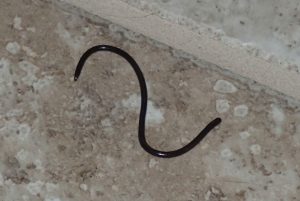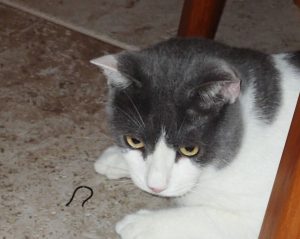Perhaps while working in your yard you have come across an animal that looked very much like an earthworm… but not quite… have you considered it might be a snake? Next time, take another look. If it is darker and smoother than you expect, it is probably a Brahminy Blind Snake (Indotyphlops braminus).
The species is originally from Southeast Asia but is now found in much of the world. It most likely traveled in potted plants and is sometimes called the flower pot snake. Their bodies move back and forth like a snake but do not expand and contract like the segmented earthworm. The good news is that the Brahminy Blind Snake is not venomous or thought to push out native species. It is exotic (not native) but not invasive.
The adult is 2.5 to 6.5 inches long. The head and tail tips are not easy to identify from one another. It doesn’t have a neck, the eyes are just remnants, and the tail has a tiny barb. It burrows in soil and leaf litter and is found under rotting logs, leaves and trash. It feeds on the eggs, larvae, and pupae of ants and termites. All of the snakes are female. Their reproduction is remarkably interesting. Offspring may be live born or hatched from eggs. No fertilization is required.
I have often seen these in the soil. The bad news is they can make their way into your house. I was recently reminded of this when I found my cat fascinated by something under the dining room table. They move pretty fast on the tile floor. She was getting some badly needed exercise, so I let her play. I believe that she eventually ate it. I have previously found the snakes both dead and alive in the house. Fortunately, not often enough to think of it as a problem. 
So, the next time you come across an off-looking worm, look more carefully, it might be a Brahminy Blind Snake. I suggest that if you do not find them as interesting as I do and the thought of any snake repulses you, just pretend it is a worm, they’re equally harmless.
This article was written by Master Gardener Volunteer Sue Grinath under supervision of the Master Gardener Volunteer Coordinator and Residential Horticulture Agent Anne Yasalonis.
For more information, contact UF/IFAS Extension Polk County at (863) 519-1041 or visit us online at http://sfyl.ifas.ufl.edu/polk. The Plant Clinic is open Monday-Friday, 9:00 am-4:00 pm to answer your gardening and landscaping questions. Visit us in person, give us a call, or email us at polkmg@ifas.ufl.edu.
If you are not in Polk County, Contact your local UF/IFAS Extension Master Gardener Volunteer Plant Clinic.
The Florida Master Gardener Volunteer Program is a volunteer-driven program that benefits UF/IFAS Extension and the citizens of Florida. The program extends the vision of the University of Florida/Institute of Food and Agricultural Sciences, all the while protecting and sustaining natural resources and environmental systems, enhancing the development of human resources, and improving the quality of human life through the development of knowledge in agricultural, human and natural resources and making that knowledge accessible.
An Equal Opportunity Institution.
 0
0
